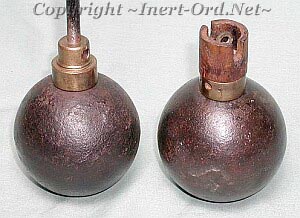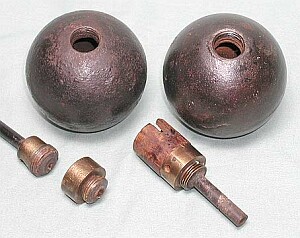


The Mle.1914 was the last derivative of its type which began over 65 years earlier with the Grenade Modèle 1847, having the same 81mm iron ball but using a very simple wood plug fuze with friction igniter.
For centuries, the classic hand grenade style was basically a small hollow iron sphere with a black powder filler and some kind of rudimentary match fuze. The 1914 model shows improvements in the fuze design. Both the rod and hand types are delay fuzed. The hand grenade uses a fiction igniter attached to a pull ring. In use, a tether was attached to the user's wrist and connected to the ring. When thrown, the ring was pulled after the grenade was on its way, a reflection of the unpredictable nature of grenade technology of the time.
What is of interest here is that the rod grenade's fuze was initiated by the flame from the rifle round as it passed up through the hollow rod. As far as I know this is the only rifle grenade with this kind of fuze ignition system.
It probably wasn't that reliable as there is no vent in evidence at the grenade-end of the rod. One would think that the flame would have a hard time finding its way to the fuze element do to back pressure. No doubt that the rod was readily plugged with foreign matter as well.
The detonator tube has been cut from the rod grenade fuze, but it appears the bottom piece is pretty much the same as the intact hand grenade example shown.
